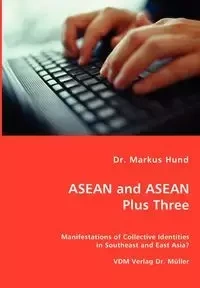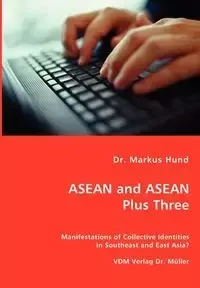ASEAN and ASEAN Plus Three - Manifestations of Collective Identities in Southeast and East Asia? - Markus Hund
ASEAN and ASEAN Plus Three - Manifestations of Collective Identities in Southeast and East Asia? - Markus Hund
EAN: 9783836450454
Symbol
268EUN03527KS
Autorzy
Markus Hund
Rok wydania
2007
Elementy
428
Oprawa
Miekka
Format
17.0x24.4cm
Język
angielski

Bez ryzyka
14 dni na łatwy zwrot

Szeroki asortyment
ponad milion pozycji

Niskie ceny i rabaty
nawet do 50% każdego dnia
Niepotwierdzona zakupem
Ocena: /5
Symbol
268EUN03527KS
Kod producenta
9783836450454
Autorzy
Markus Hund
Rok wydania
2007
Elementy
428
Oprawa
Miekka
Format
17.0x24.4cm
Język
angielski

East Asia is a region undergoing vast structural changes. As the region moved
closer together economically and politically following the breakdown of the
bipolar world order and the ensuing expansion of intra-regional
interdependencies, the states of the region faced the challenge of having to
actively recast their mutual relations. At the same time, throughout the
1990s, the West became increasingly interested in trans- and inter-regional
dialogue and cooperation with the emerging economies of East Asia. These
developments gave rise to a "new regionalism", which eventually also
triggered debates on Asian identities and the region's potential to integrate.
Before this backdrop, this thesis analyses in how far both the Association of
Southeast Asian Nations (ASEAN) and the ASEAN Plus Three forum (APT: the
ASEAN states plus China, Japan and South Korea) represent
intergovernmental manifestations of specific collective identities in Southeast
Asia and East Asia, respectively. Based on profiles of the respective discursive,
behavioral and motivational patterns as well as the integrative potential of
ASEAN and APT, this study establishes in how far the member states adhere
to sustainable collective patterns of interaction, expectations and objectives,
and assesses in how far they can be said to form specific 'ingroups'. Four
studies on collective norms, readiness to pool sovereignty, solidarity and
attitudes vis-à-vis relevant third states show that ASEAN is firmly grounded in
a certain grown collective identity, though its political relevance is frequently
thwarted by changes in its external environment. A study on the cooperative
and integrative potential of APT yields no manifest evidence of an incipient or
ongoing pan-East Asian identity formation process.
EAN: 9783836450454
EAN: 9783836450454
Niepotwierdzona zakupem
Ocena: /5
Zapytaj o produkt
Niepotwierdzona zakupem
Ocena: /5
Napisz swoją opinię

